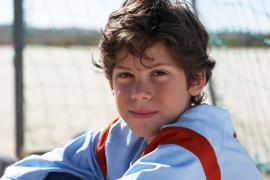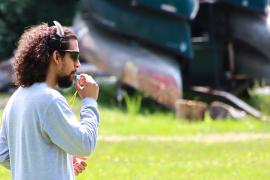In honor of World Mental Health Day on October 10, Linda Ebner Erceg, RN, MS, PHN, shares some mental, emotional, and social health (MESH) situations that may occur at camp and how to respond appropriately.
Eight-year-old Mike got through the first couple days of camp. Then, on day three, he broke into hard, wrenching tears as his cries of “I just want Mom!” echoed through camp.
Fifteen-year-old Tony also made it through the first couple days. Then his resolve evaporated. He exploded when a cabinmate, again, grabbed his dry towel to use after swimming. Mike yelled, threw things, and aggressively approached the other camper with clenched fists.
Then, that same evening – day three is getting a reputation! – Brit, one of your returning counselors, asked to talk with you. She disclosed that she’s a “recovering alcoholic” who thinks she needs time to get to an AA meeting at least once a week. She’d been doing that at home and didn’t think she’d need it while at camp. But she does.
Each of these represents a human response to a person’s compromised mental, emotional, and/or social health (MESH) needs. Camp professionals bump into MESH needs of campers and other staff on a daily basis. Often the individual has adequate and effective coping skills, so the triggering concern never rises to a level of concern. But sometimes that isn’t the case . . .
And we’re left to figure out an appropriate response, one that both maintains the integrity of the compromised person while also protecting others and their camp experience. This can be tricky. Is the concern one associated with the person’s developmental stage and, as such, might respond to effective coaching? Eight-year-old Mike’s outburst could be that. Or does the concern reflect a true compromised MESH aspect, something that Brit’s need for AA support could be?
The world of a camp professional is peppered with these situations. Many of us develop a sense for what needs greater help than what we – or the camp setting – might provide. Courses like Mental Health First Aid (www.mentalhealthfirstaid.org) train us to appropriately respond in times of crisis. But how can we set up the camp experience to minimize the potential for it to trigger MESH challenges? And, when it does, who can we access for help?
Our camp community is getting better at this. Indeed, some camps now include a MESH statement as part of their essential functions for staff, thus recognizing that appropriate and effective MESH responses are essential to many (all?) camp jobs. In addition, our camp community is beginning to go beyond using only age and grade to define essential eligibility criteria for campers. This is especially important as we seek to become more inclusive while balancing that with the camp’s mission, resources and the skills of people who work there. Has your camp developed these statements for your staff and campers?
In spite of preparing for people like Mike, Tony and Brit, MESH incidents will still occur. They may be less frequent and/or impactful because of our preparation, but they will still occur. This is when help from a mental health professional is needed. Camps that have established these relationships can attest to their value. Some camps have broadened their inclusive perspective to the point where having a MESH professional at camp is simply the way they function. But other camps have programs that aren’t appropriate for everyone and, in spite of having expanded MESH statements for both staff and campers, an occasional incident occurs where professional help is needed. In such instances, knowing who to contact and at what point becomes the security blanket. Have you established this for your camp?
The MESH area continues to be one of four foci of ACA’s Healthy Camp Initiative. Look for more educational pieces to appear on both ACA and ACN (Association of Camp Nursing) websites, educational events in conferences, and specific trainings such as Mental Health First Aid in your local area.
All of us have MESH needs. Meeting these is as critical to the camp experience as physical safety. As we celebrate World Mental Health Day, audit your camp program to determine its MESH resiliency and address concerns that arise from your consideration.
Looking for Resources?
- Linda Erceg wants to hear from you! What have you done to address MESH concerns? What MESH concerns are tough to handle? What resources have you discovered? Contact Linda via email [email protected] or phone at 218-444-5923.
- T. Gaslin’s article, "Essential Functions of a Camper: Analysis & Determination."
- Tool “Assessing a Camper’s Behavior of Concern” available online from ACA’s Healthy Camp Toolbox.
Linda Ebner Erceg, RN, MS, PHN, is the program coordinator for Bemidji State University's Certificate in Camp Nursing (MN). Her experience includes over 30 years as a year-round camp nurse for Concordia Language Villages and deep experience in working with camp professionals to address camp health needs. She currently chairs ACA's Healthy Camps committee where her time at camp as well as her former role as executive director for the Association of Camp Nursing now contributes to her educational and research activities.
The views and opinions expressed by contributors are their own and do not necessarily reflect the views of the American Camp Association or ACA employees.




